Items
topic_interest is exactly
student
-
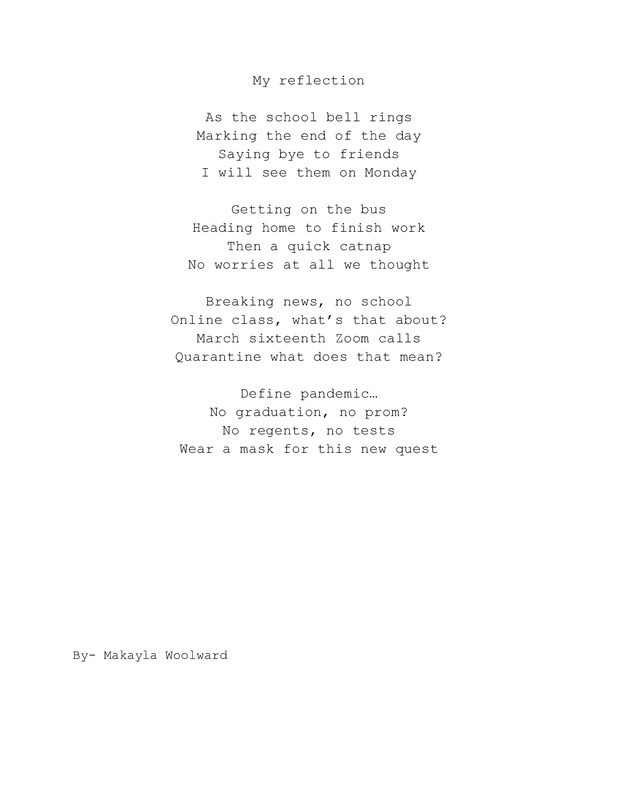 2020-03-16
2020-03-16Makayla Woodward's Reflection
A haiku poem of my experience on the school day before quarantine started and when it was announced. This poem is important to me because it shows a high school student's perspective on the pandemic. Many did not know the meaning of the events occurring not knowing how it would impact the rest of our lives. -
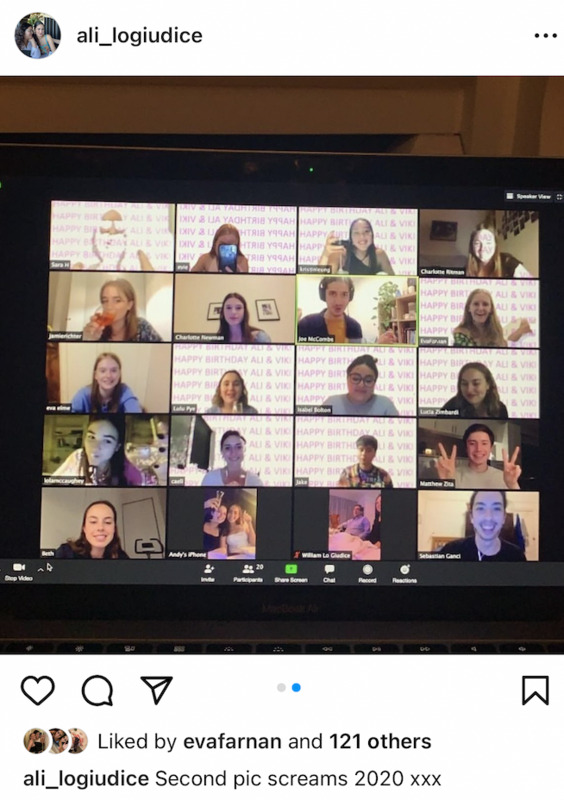 2022-10-31
2022-10-31Reflecting on COVID19 as a student who started and ended her degree in the midst of the global pandemic. (HIST30060)
I’ve selected 5 different photos which give a little insight into being a tertiary student during the COVID19 pandemic. I started my Bachelor of Art degree in March of 2020, fresh out of high school. I was so incredibly excited and had a great first few weeks (I think one or two) and O-Week. I was lucky enough to go on a first year Arts student camp in February, where I made a handful of friends that I am still close with today; it was this small social interaction that really served as the bulk of my Uni social life for my degree because ‘going online’ severely stunted my ability to connect with new people. In the screenshot of a Zoom conference call, I am having a zoom call with some of the people I meet on this camp, a kind of ‘reunion’ during the first lockdown in 2020. Reflecting on some of the other limitations on the social life of a young student who is very social, I have included a screenshot of an Instagram post I did in April of 2020. It was my 19th birthday, and my ‘obligatory’ birthday post for the year looked a lot different to other years. Rather than being out celebrating with friends in real life, we did a group zoom call where we sang Happy Birthday and my friends watched me cut my cake through a screen. Some people got dressed up, donning dresses and a full face of makeup, to just wash it off when you clicked the camera off for the night. It was lovely to connect but looking back at these pictures now just leaves me with a strange, eerie feeling. I have included a picture of my university set up, a table in our garden and my dog, Margot. I found it really hard to study in my house all the time, so I would often try to move around to different study zones in my house. I really focused on my study during lockdown, it felt like it was a productive use of time and something I could channel my thinking into. However, thinking so much about University, and always having it in my home (it was not like I was moving between a ‘home space’ and a ‘study space’) was really tiring and draining. Every day just felt the same. I have decided to take a gap year next year rather than moving straight into post-graduate study because I don’t want to feel that same kind of burn-out again. Finally, I have two pictures which encapsulate some pass times during lockdown. One is my sister painting my bedroom walls; we did a lot of home improvement and beautification, giving ourselves little tasks and jobs that we could complete and feel satisfied with. The other picture is my sister and dog on the beach during a winter’s eve walk. I included this picture because her mask is visible. This picture was taken when there were restrictions about the quantity of family members you could walk with, the time you could leave your house, the necessity of wearing a mask and how far you could go from home. When this picture was taken, we had a curfew in place in Victoria (I think you had to be home before 10pm), you could only walk with household members, but only in groups of two at a time, you could not go further than 5km away from your home and you had to wear a face mask even when just walking your dog to a quiet beach. Reflecting on these harsh rules and the feelings I had at the time makes me feel quite sad as I feel like I missed out on so many experiences that I was promised with my university degree. My experience as a Bachelor student was so far from what it should have been; so while I am extremely proud to be graduating in a few weeks, proud that I loved what I studied, felt empowered by what I learnt and feel like my academic skills have improved so much, I feel sad that I missed out on social connection, a sense of belonging to a school community, meeting people who are outside my regular circles, experiences with clubs and teams, not being able to use campus facilities and spaces. I am so lucky that I was extremely privileged in the lockdown, my family was all healthy, safe, we had minimal arguments, and they made me smile despite the circumstances; my friends were beyond wonderful, and I had a safe place to live and access to my university and learning online. But when I think back to the lockdowns and the impact of them, I still can’t help but get emotional. More than anything, I always find myself shocked about what we all went through and how unique it was. -
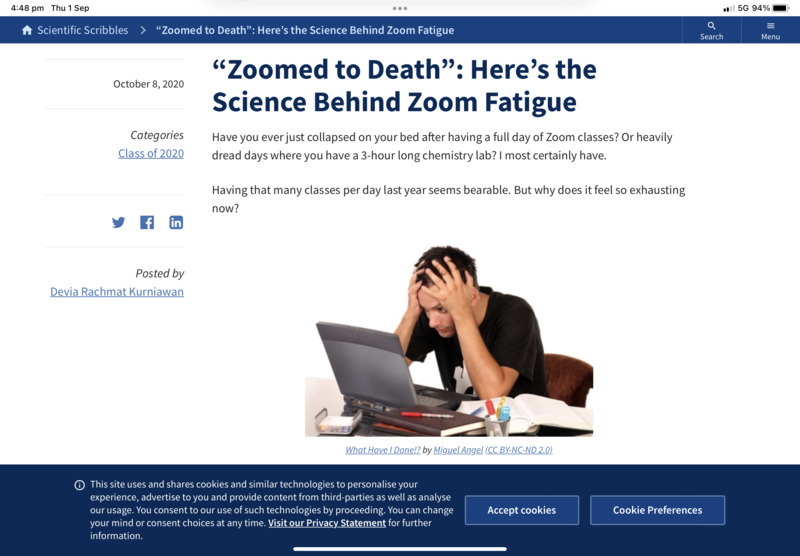 2020-10-08
2020-10-08“Zoomed to Death”: Here’s the Science Behind Zoom Fatigue
Students all over Australia experienced struggles with the pandemic affected learning environments, one of the most challenging at the a University of Melbourne was the use of Zoom calls for learning and how it impacted motivation to learn and overall fatigue. -
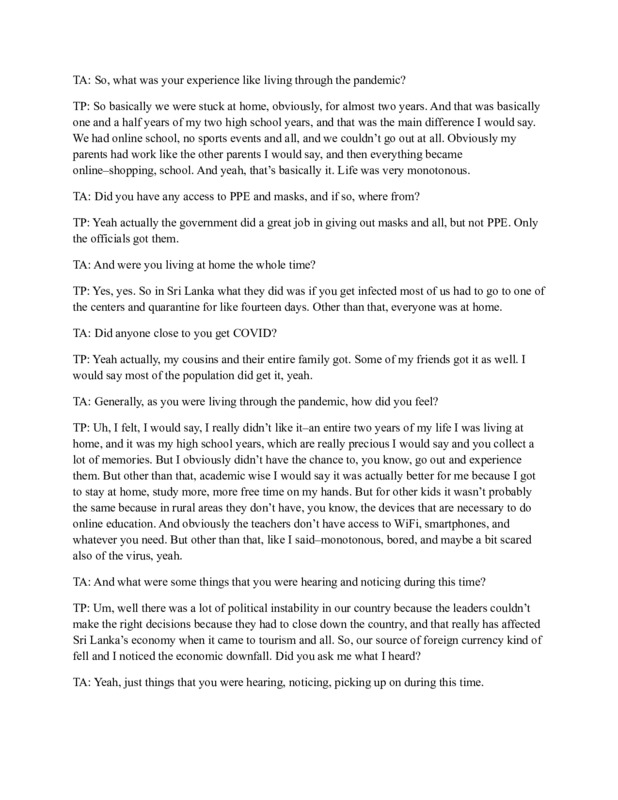 2022-05-04
2022-05-04Experiencing the Pandemic as a Student in Sri Lanka
It provides the pandemic perspective of a student from Colombo, Sri Lanka. -
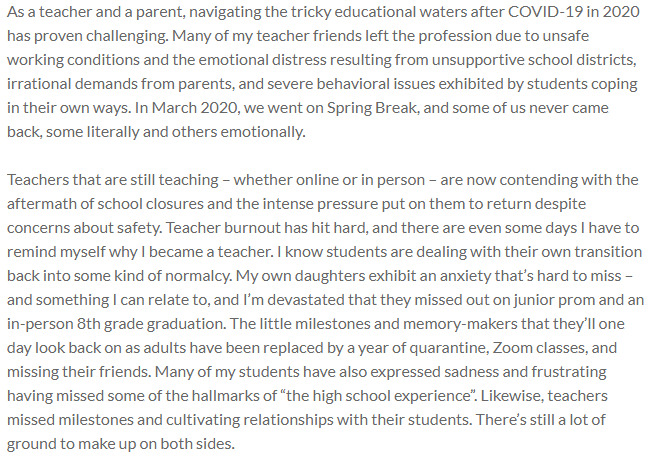 2022-01-16
2022-01-16Still On Spring Break?
As a teacher and a parent, navigating the tricky educational waters after COVID-19 in 2020 has proven challenging. Many of my teacher friends left the profession due to unsafe working conditions and the emotional distress resulting from unsupportive school districts, irrational demands from parents, and severe behavioral issues exhibited by students coping in their own ways. In March 2020, we went on Spring Break, and some of us never came back, some literally and others emotionally. Teachers that are still teaching – whether online or in person – are now contending with the aftermath of school closures and the intense pressure put on them to return despite concerns about safety. Teacher burnout has hit hard, and there are even some days I have to remind myself why I became a teacher. I know students are dealing with their own transition back into some kind of normalcy. My own daughters exhibit an anxiety that’s hard to miss – and something I can relate to, and I’m devastated that they missed out on junior prom and an in-person 8th grade graduation. The little milestones and memory-makers that they’ll one day look back on as adults have been replaced by a year of quarantine, Zoom classes, and missing their friends. Many of my students have also expressed sadness and frustrating having missed some of the hallmarks of “the high school experience”. Likewise, teachers missed milestones and cultivating relationships with their students. There’s still a lot of ground to make up on both sides. -
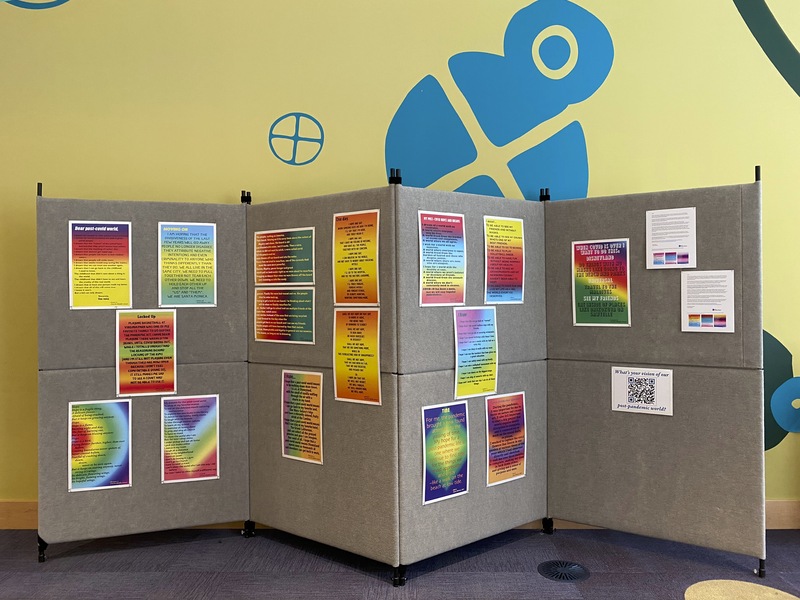 0002-03-01
0002-03-01SMhopes at the SMPL Teen Lounge
A variety of submissions to the SMhopes website, designed as posters and banners by Paula Goldman, and installed in the Teen Lounge at the main branch of the Santa Monica Public Library. The Library asked for a variety of hopeful messages as they begin having students visit the Teen Lounge again. -
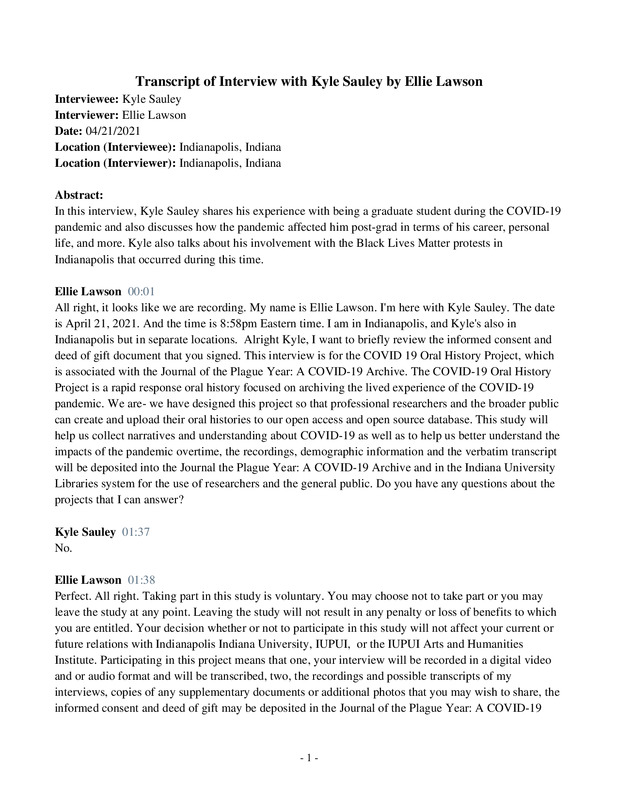 05/03/2021
05/03/2021Kyle Sauley Oral History, 2021/05/03
-
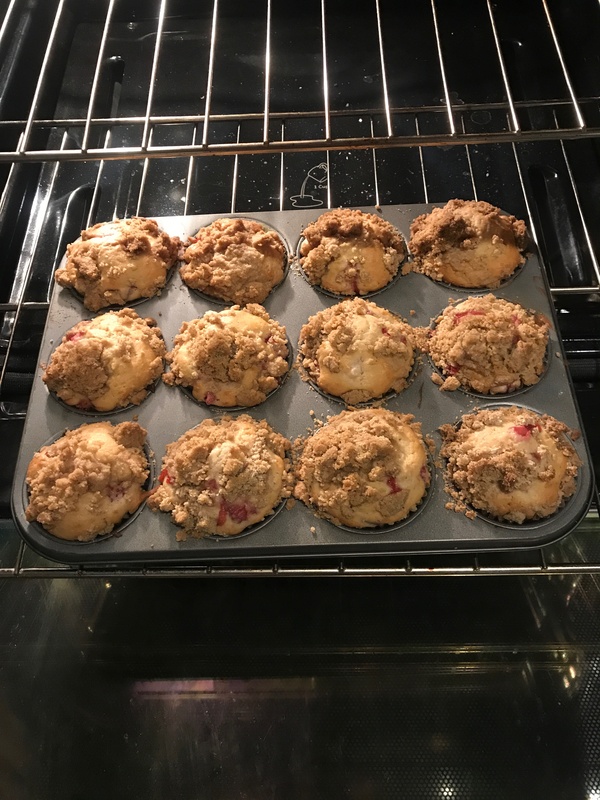 2020
2020Cooking During Quarantine
As a 14 year old kid during quarantine, I had not much to do. I was separated from my friends and longing for ways to feel free. At times, I even found myself begging to go into school, wanting to go back to the old world. Now, everyday would be the same routine. I would wake up and get on my zoom class, eat, and repeat. Yet soon, I began cooking. I found a way to connect and find myself through the foods I baked with my family. Now, I cook whenever I can. -
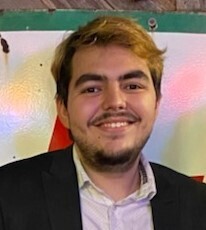 2021-12-03
2021-12-03Jorge Martinez Oral History, 2021/12/03
Student Jorge Martinez relates how his experience as a St. Mary's University student living on campus for the first time in Fall 2020 amid the pandemic. Jorge was able to contact the office of student retention and Student Life to support the challenges he was facing during the pandemic. -
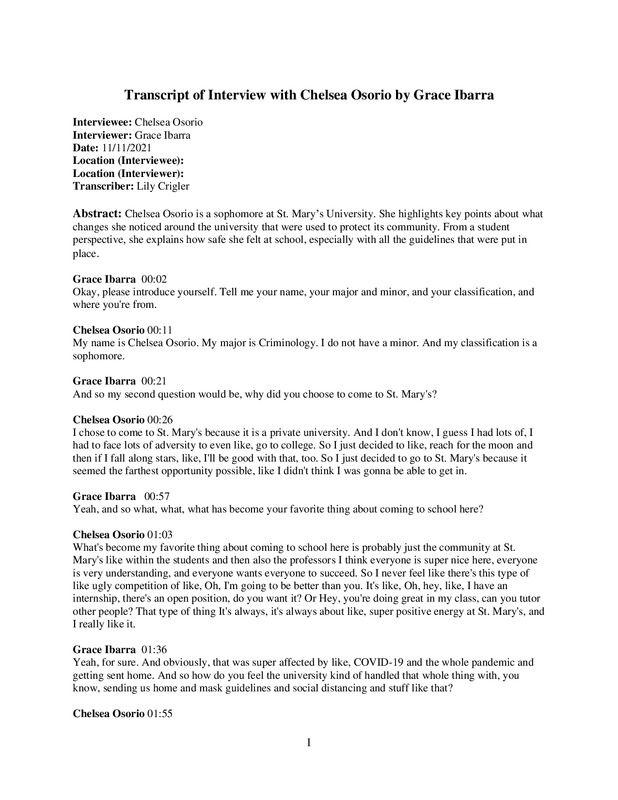 2021-11-11
2021-11-11Commuter Student Perspective on University Changes
Chelsea Osorio is a commuter student at St. Mary’s University and among the many personally affected by the COVID-19 pandemic. In her interview she highlights key points about what changes she noticed around the university that were used to protect our community. From a student perspective, she explains how safe she felt at school, especially with all the guidelines that were put in place. This goes to show how St. Mary’s students, faculty, and staff were committed to ensuring not only a healthy online environment but also making sure we returned to a safe and healthy community. -
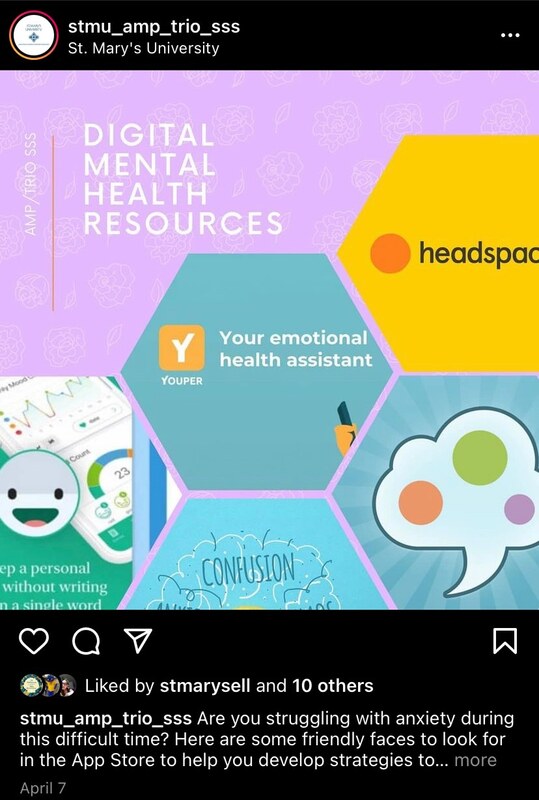 2021-04-07
2021-04-07The Mental Pandemic
The pandemic was difficult in more ways than one. Health and safety were covered by all news stations, but the deeper hidden pandemic was the struggle of mental health and staying mentally healthy during isolation and lockdown. These screenshots showcase that mental health was an important topic that people were struggling with but the university tried to give help to students and staff that were struggling. This screenshot is important to me because they were resources I utilized that helped me mentally go through the pandemic and I believe deserve more attention. -
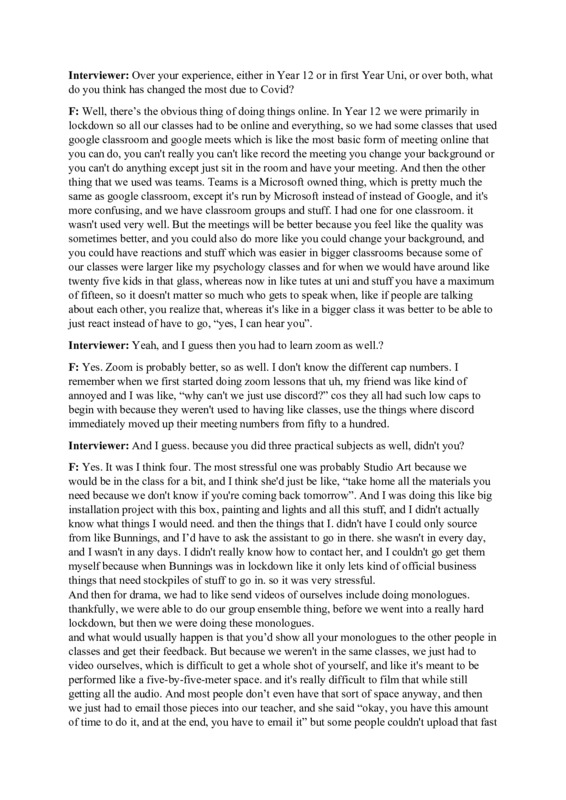 2021-10-15
2021-10-15HIST30060: From Year 12 to First-Year University
I interviewed my younger sibling, 'F', and transcribed the audio. They completed Year 12 in 2020 and then began university in 2021, which I believe is a significant transitionary time especially in the context of Covid to document. Their experiences in using different media forms for online classes is insightful and provides an interesting comparison. Additionally they provide insights into changing interests, socialising online, and reflecting on the world around them. They reflect on how they believe the nature of people has changed in relation to each other in an isolated but connected world, which I believe will be an interesting and informative insight for the future to gain an indepth understanding of the Covd-19 era from the perspective of the youth. -
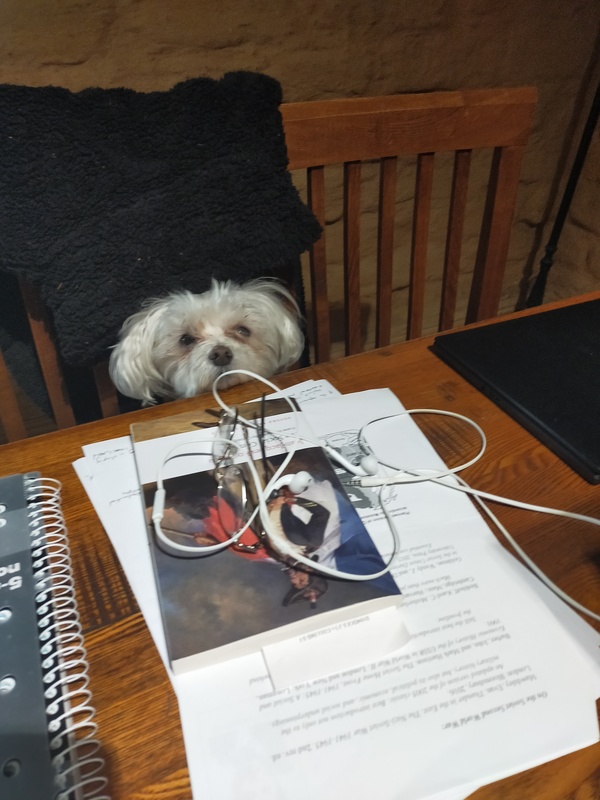 2021-05-10
2021-05-10HIST30060: Helping Me Study
This is photograph shows one of my dogs, Elfie, sitting next to where I study for university during the pandemic. She and her sister, Bowie, would fall asleep next to me and keep me company. Often, they would help keep me motivated when I was struggling by hassling me back to the table. It is easy to look back over the past two years and look at the negatives, however, it is moments like the one depicted in the picture which help remind me that there were positive moments too. -
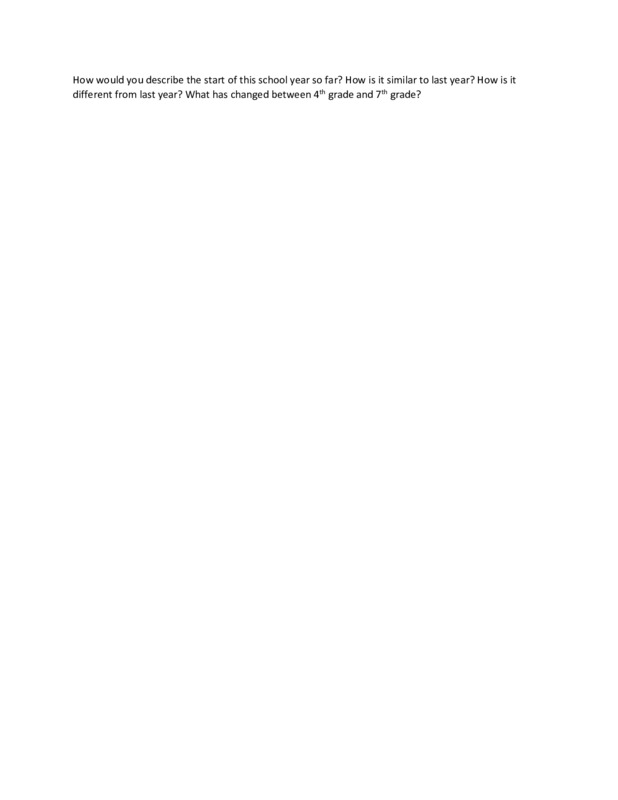 2021-10-08
2021-10-08Lone Star WIN Journal Assignment
Each week Lone Star students sign up for a WIN session. WIN stands for What I Need - these session are designed as interventions for missed material or to provide an extension opportunity in classes. The students who completed this assignment were selected by their social studies teacher to create a journal entry to submit to the archive. WIN sessions take place 4 times per week and are only 30 minutes in length. Because of these time restrictions journal entry lengths are a little short but kids were very excited to write their names in the history books! -
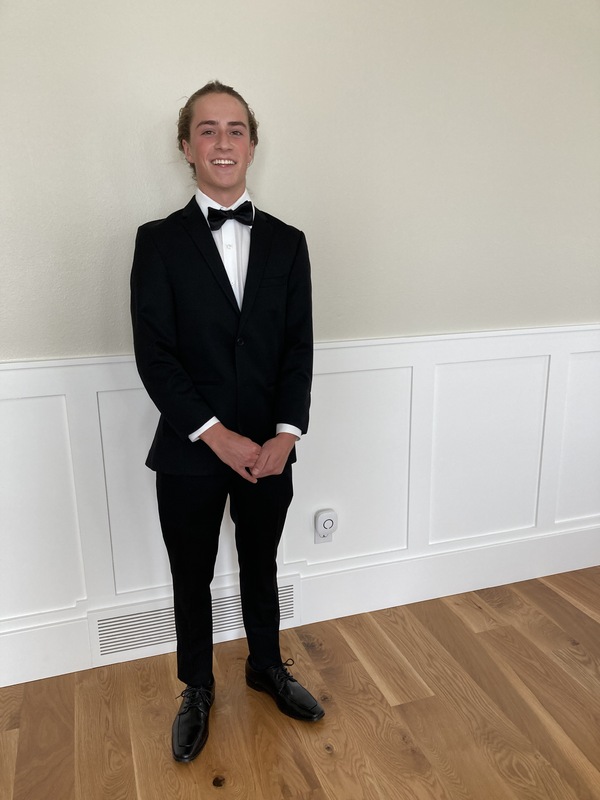 2021-10-05
2021-10-05Nate LeMonnier Oral History, 2021/10/05
It was fun to ask my son about his experience during the pandemic. He handled the whole thing really well which comes across in the interview. I've transcribed the text in the attached Word doc. -
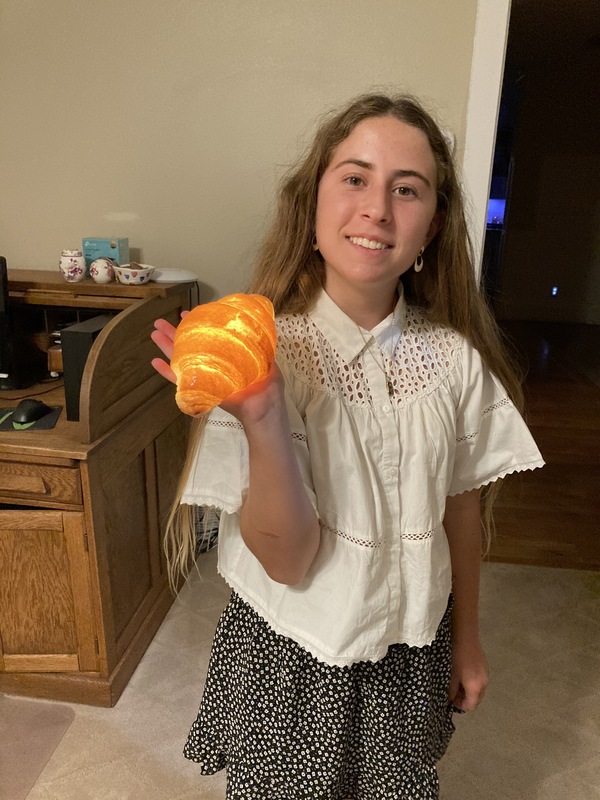 2021-10-05
2021-10-05Marci LeMonnier Oral History, 2021/10/05
As her parent, it was interesting to ask my daughter questions about the pandemic and hear her responses. As a family, we were really lucky to stay healthy and be able to spend a lot of extra time together. I've transcribed the interview in the attached Word file. -
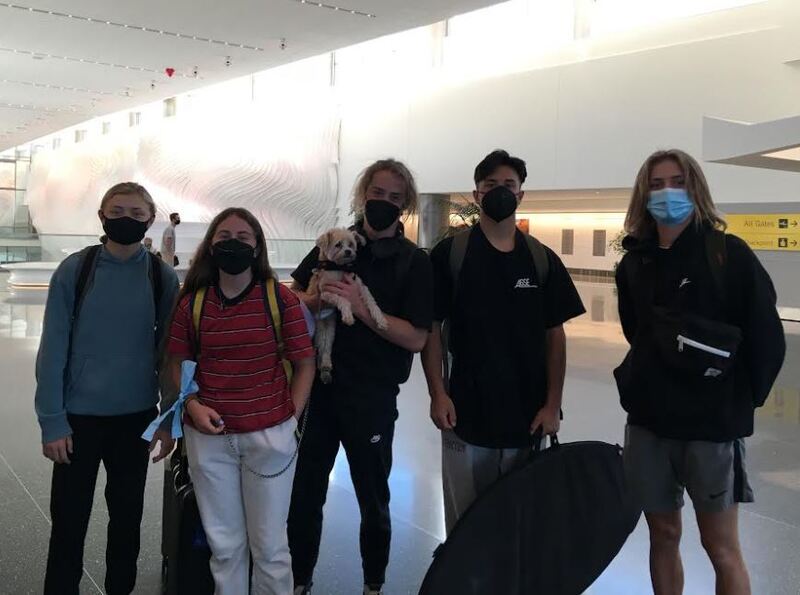 2021-10-05
2021-10-05Masks in Puerto Rico with Five High Schoolers
This summer (2021) my husband and I were lucky enough to take our two high schoolers along with three of their friends to Puerto Rico. It was a way to escape the boredom of Utah as well as its high Covid rate. Of course we wore masks in the airport and the airplanes and continued to wear them in all public places in Puerto Rico, even outside. The teenagers were resistant to wearing masks because Utah had stopped wearing them in March 2021. I explained to them that not only was the Puerto Rican government asking us to wear masks, but the local culture was expecting them too. I realize that this picture shows them not wearing masks but they wore them indoors and when we were near people outdoors – but almost never for pictures! -
2020-03-15
The Pandemic Student
Being a student during the COVID-19 pandemic seemed easy at first since we were all going to be at home for the rest of the Spring semester of 2020. I thought of it as a time to finally relax and slow down on classes now that we were going to be home. But I didn't expect the amount of change the pandemic actually brought to my life. I didn't realize how much I relied on my everyday school schedule to organize my daily routines. When in-person classes stopped, the first week of classes at home seemed easy. I thought I could do it. But as time passed, I realized how difficult it was to keep up with class demands as well as home demands now that both were in the same environment. Some of my classes became asynchronous, while others became live. Waking up on time became difficult when I was able to stay in the comfort of my bed the whole day. And being on my laptop for all of my classes made it easy to be distracted by other things on the internet. Being at home meant I could fall asleep in class without anyone directly seeing me. With no school schedule, such as common hours, walking to and from classes, meeting up with friends during gaps, the routine in my life seemed non-existent. I was at home all day, and my sense of order seemed to fade as the semester went on. The type of student I used to be was usually a lot more punctual, submitting assignments on time, taking notes during class, finishing homework early. But the type of student the pandemic changed me into was lazy, sleepy, tired, late in submitting assignments, more careless about classwork and homework, skipping a lot of note-taking in class, and delaying work. My orderly life, my daily routine, was now out of order and out of routine. It became very hard to be a good student during the pandemic because my lack of motivation swooped low. By Fall semester of 2020, I was already falling off track within the first two to three weeks. By the end of the semester, I even failed to submit an important final on time. Although I was becoming such a terrible student, many of my professors remained understanding, kind, and caring, giving me extended time on late assignments, and providing support when I needed it. I don't think I would have passed all of my classes if it weren't for the kindness of many of my professors. My worst semester was Spring of 2021. I had to take a writing intensive course. Although I was only taking 4 classes, that one class felt so heavy that it was the main course I was focusing on. The course also had a lab section, which would've been better done in-person. Doing in-person classes online was not the best experience. While in an in-person lab students would be working together and classwork would be done together, online we were just given directions and told to submit the classwork after working on it ourselves. It became so difficult that I ended up dropping the class and taking it again in the summer. Though it was my worst semester ever, my professors were still so kind and understanding, supporting my decision and wishing me well. Although it seemed being a student during the pandemic would be easy at the beginning, I quickly realized how far that was from the truth. The pandemic teared apart my routine, which I didn't realize how heavily I relied on. The order in my life felt close to chaotic at some point and affected so many aspects of my life: as a student, a daughter, a sister, my religion, and my social life. Right now, during the Fall 2021 semester, I'm still working on building up my routine and trying to stick to it, despite being at home. I've regained some of my motivation and try to submit assignments on time, but I don't always succeed. Balance is hard when two different parts of one's life—in my case, my school and home life—become one and the same. I had a hard time allocating appropriate time for school and appropriate time for family, chores, and self-care. Perhaps by now I've gotten a bit used to the pandemic, but still prefer in-person as it would bring back that order in my life: waking up, getting ready, going to class, finishing class, doing work during schedule gaps, going to another class, etc. Now my schedule is more like: wake up, class, eat breakfast during class, be unproductive during class gaps, go to another class, etc. And through all this, I'm also on my phone or watching something else, or talking to a family member, or doing something else distracting. However, since I've been trying to build up my routine and increase my motivation, it's been easier to pay attention and work harder in class. As a senior, I obviously want to graduate on time so that is definitely a motivational factor for me to do well this semester. Because in-person class options are now available, I look forward to bringing back order to my life next Spring semester. -
2021-04
Teleworking: Good and Bad
I started a job earlier this year that is entirely remote. Before COVID-19, I would never have considered a remote job/ the possibility of teleworking simply because I thought it was something that wouldn't be possible in the field of History. Obviously this all changed when things shut down in 2020- and in some ways, the work realm changed for the better. I was able to secure a remote job relevant to my field for good pay, something that would not have been possible before the pandemic. On the other hand, working entirely remote makes it much harder to connect with coworkers and get out of the house. -
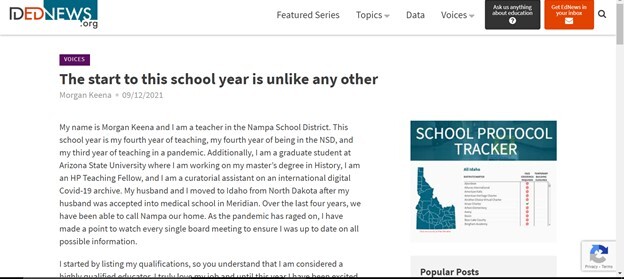 2021-09-14
2021-09-14The Start to the School Year is Unlike Any Other
I wrote an opinion piece for Idaho Education News last week after the latest school board meeting in Nampa, Idaho. Since March of 2020 educators have worked tirelessly to ensure that our students continue to receive a quality education. Initially, educators were seen as 'heroes' of the pandemic. However, over the last 9 months, the rhetoric surrounding schools and teachers has turned nasty. Yet, teachers continue to show up every single day and offer learning experiences to all children. At last week's board meeting, the discussion focused primarily on a mask mandate for our district as hospitals in our state began rationing care given the soaring number of Covid-19 cases. There was an even split between the trustees who were in favor of masking and the trustees who were against masking. This split did not come as a shock to me. However, the line of one trustee hit me in my gut, "I guess I go back to the mission statement. I'm here for the kids, so I'm not going to worry about the adults." The mission and vision statement the trustee is referencing states that teachers offer "exceptional learning experiences" for every child. Given the largely unvaccinated population of our community, the high numbers of teachers out sick, and the alarming number of students out sick as mask mandate seemed like a simple request. However, the board did not vote in favor of helping teachers ensure we are able to provide 'exceptional learning experiences.' Are masks the only answer? Not necessarily. Last year, students attended school 4 days per week while the 5th day was reserved for students to connect with students who were in quarantine/sick and unable to attend school. This year, all of those requirements are gone. That being said, students and teachers attend school 5 days per week and there is no time allotted for teachers to connect with students who are quarantined or sick. Given the latest numbers, about 25% of our entire district is out sick. That is 25% of students who do not have access to their teachers. The article was published on Tuesday, September 14, 2021, and Idaho Ed News shared it on their Facebook page as well. Shortly after 7 pm MST the post has over 160 comments (mostly in favor of teachers), 250 reactions, and over 50 shares. In addition, I have received numerous private messages and emails from other teachers who thank me for giving them a voice during this 'unprecedented' time. While I am still a fairly new teacher with only 3 years of experience, there are veteran teachers who are being pushed to the brink. Many would like to think this is an Idaho problem but the reality is that teachers across the country are feeling unsupported and unappreciated by the communities they serve. I am fearful this will be my last year teaching - I LOVE my job. I remain hopeful that this year turns out to be something amazing. -
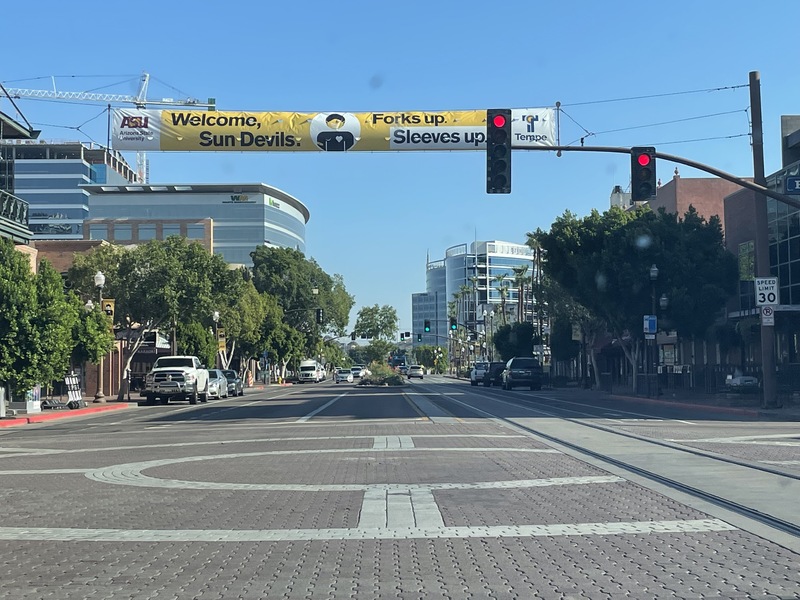 2021-08-25
2021-08-25ASU vaccine promotion banner
Classes at ASU started last week, since then, this banner has been hanging over the intersection of Mill and 5th in downtown Tempe. It reads, "Welcome Sun Devils, Forks up sleeves up." This banner is meant to encourage people moving through the area to get the COVID-19 vaccine. -
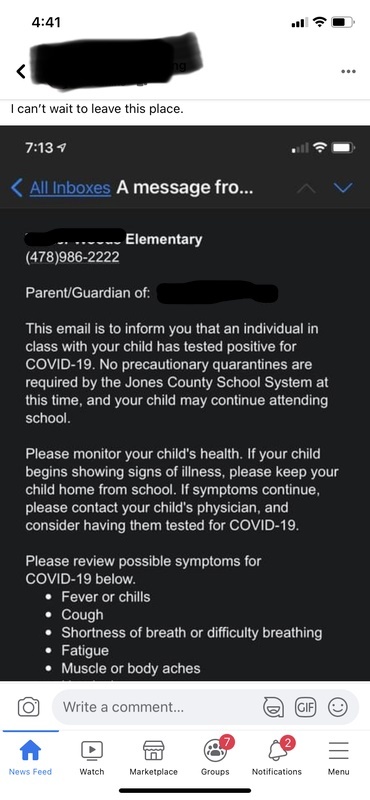 2021-08-23
2021-08-23Jones County, Georgia
A friend of mine shared her experience with how her child’s school is handling the pandemic and exposure when kids test positive for Covid. She also shared the short conversation with her child’s teacher after receiving an email from the school. -
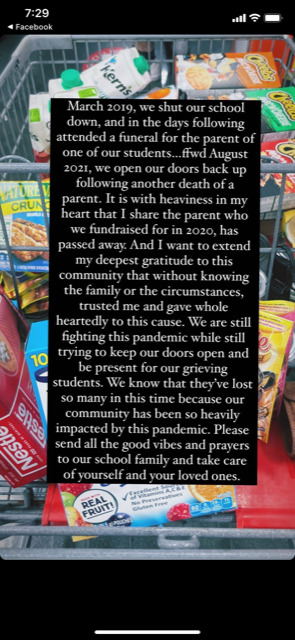 2021-08-16
2021-08-16from the eyes of a teacher
A friend of mine is a teacher for the Los Angeles School District. She shared on social media how Covid has impacted her school and its students. -
 2020
2020H396 University of San Francisco prompt
Prompt given to University of San Francisco students in H396, taught by Kathryn Nasstrom -
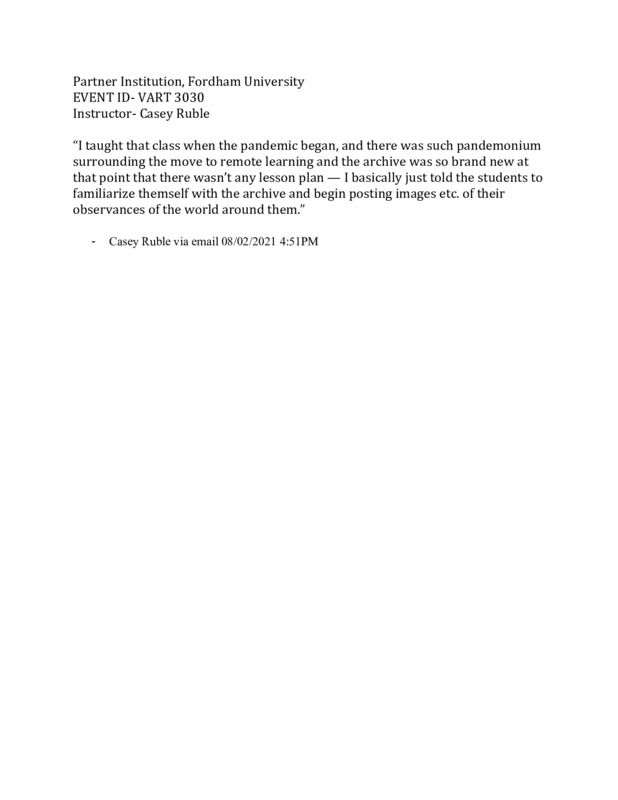 2020
2020VART 3030 Fordam University, email of assignment prompt
Email from Casey Ruble, an instructor at Fordham University, VART 3030. Asked students to "familiarize themself with the archive and begin posting images etc. of their observances of the world around them." Students submitted to archive during the Spring semester 2020 -
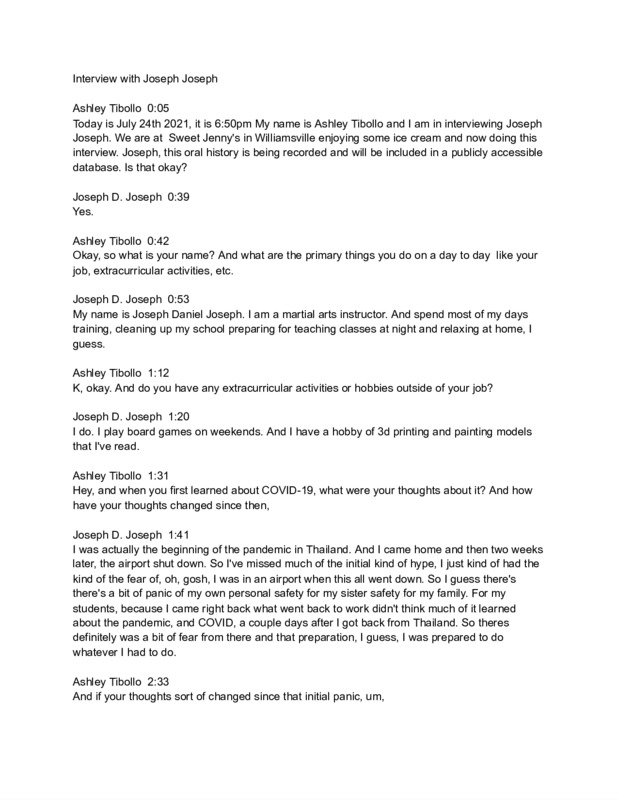 2021-07-24
2021-07-24Joseph D. Joseph, Oral History, July 24, 2021
Ashley Tibollo sits down with Joseph D. Joseph in an ice cream shop in Buffalo, New York to discuss how his life has been affected by the COVID-19 pandemic. In this interview, Joseph describes changes in his day-to-day routine, his life as a martial arts instructor, and changes in his economic status. He also discusses his students and how the pandemic affected them. In the last part of this interview, Joseph discusses his views on politics and what he hopes the future generations will learn about the response to this pandemic. -
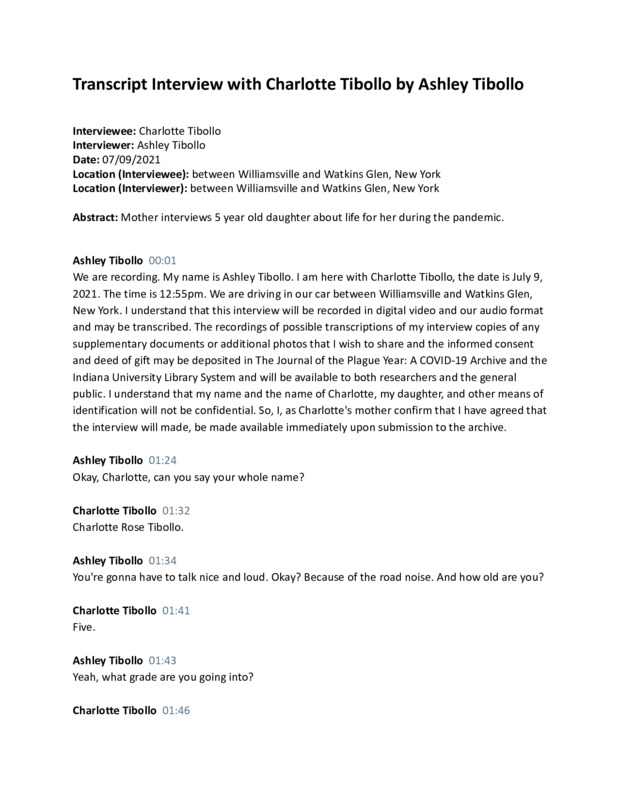 2021-07-09
2021-07-09Charlotte Tibollo Oral History, 2021/07/09
Mother interviewing 5 year old daughter about the pandemic. -
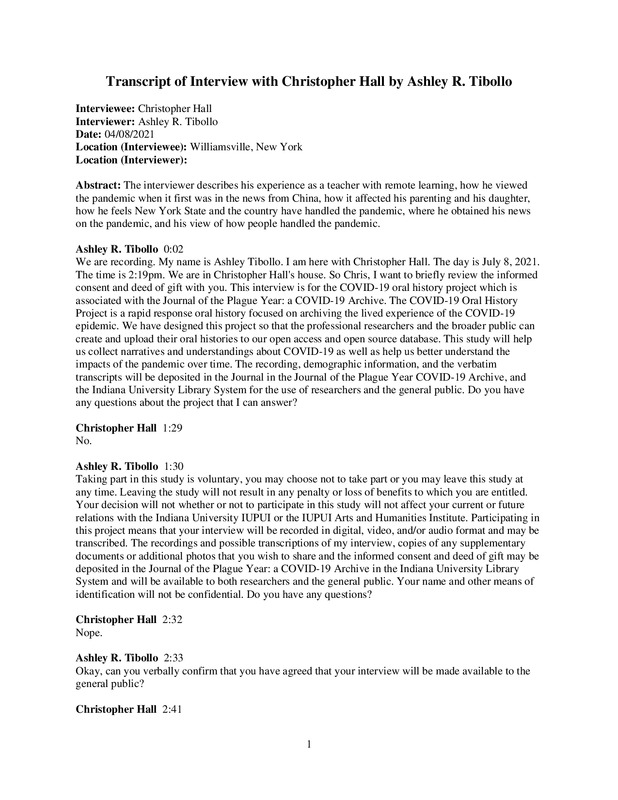 07/08/2021
07/08/2021Christopher Hall Oral History, 2021/07/08
The interviewer describes his experience as a teacher with remote learning, how he viewed the pandemic when it first was in the news from China, how it affected his parenting and his daughter, how he feels New York State and the country have handled the pandemic, where he obtained his news on the pandemic, and his view of how people handled the pandemic. -
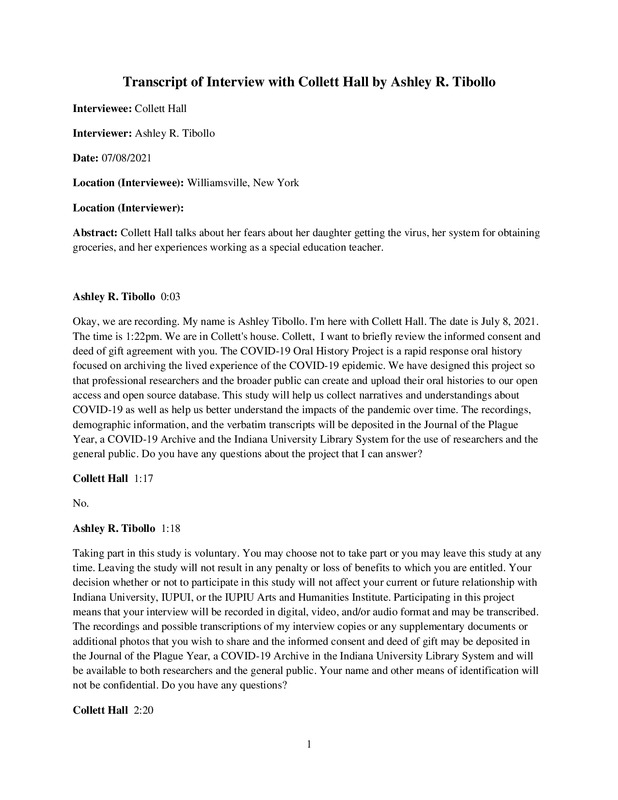 07/08/2021
07/08/2021Collett Hall Oral History, 2021/07/08
Collett Hall talks about her fears about her daughter getting the virus, her system for obtaining groceries, and her experiences working as a special education teacher. -
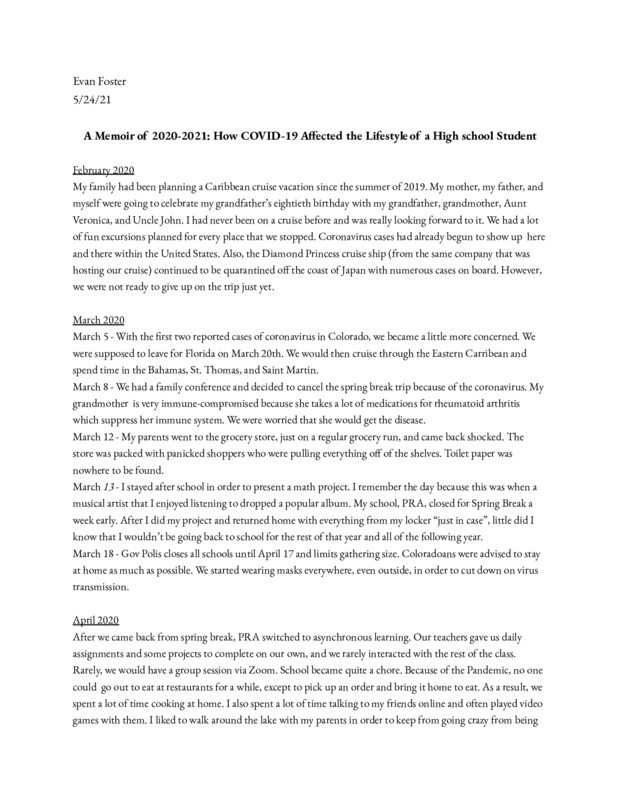 2021-05-24
2021-05-24A Memoir of 2020-2021: How COVID-19 Affected the Lifestyle of a High school Student
The PDF tells the story of my life over the years from 2020-2021. It explains how covid affected the lifestyle of a high school student, with many other added details. -
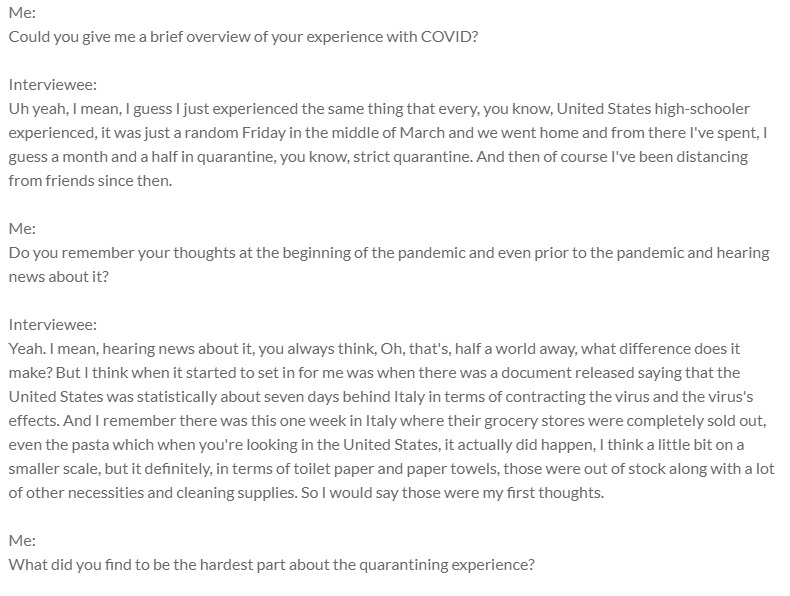 2021-02-07
2021-02-07An Interview On 2020
Me: Could you give me a brief overview of your experience with COVID? Interviewee: Uh yeah, I mean, I guess I just experienced the same thing that every, you know, United States high-schooler experienced, it was just a random Friday in the middle of March and we went home and from there I've spent, I guess a month and a half in quarantine, you know, strict quarantine. And then of course I've been distancing from friends since then. Me: Do you remember your thoughts at the beginning of the pandemic and even prior to the pandemic and hearing news about it? Interviewee: Yeah. I mean, hearing news about it, you always think, Oh, that's, half a world away, what difference does it make? But I think when it started to set in for me was when there was a document released saying that the United States was statistically about seven days behind Italy in terms of contracting the virus and the virus's effects. And I remember there was this one week in Italy where their grocery stores were completely sold out, even the pasta which when you're looking in the United States, it actually did happen, I think a little bit on a smaller scale, but it definitely, in terms of toilet paper and paper towels, those were out of stock along with a lot of other necessities and cleaning supplies. So I would say those were my first thoughts. Me: What did you find to be the hardest part about the quarantining experience? Interviewee: I mean, I think there's just a sense of loneliness. I was at my previous school because I just transitioned to another school for high school and I kind of felt cheated out of those last few months of summer with my friends back at home and now I've been cheated out of all of winter term staying here at home. So in that sense, I've just felt a lot of frustration, but then also like a lot of loneliness in terms of quarantining. Me: Yeah. I think I understand that. Were you optimistic for 2020, at the beginning of the year? Did you have high hopes for the year? Did you say this is going to be Eleanor's year? Interviewee: Um no. I kind of find that whole thing cringy. I hate new year's resolutions personally, just because statistically the majority of people do not stay with them. I set goals every new year, but I don't really think of them as resolutions because, what am I resolving a part of my identity or something like? I don't really believe in that. So I wouldn't say I had high hopes for 2020, but I would say I had a lot of goals specifically in terms of my education and personal/social lives that were not able to come into fruition because of the virus. Me: Hmm. Are you optimistic for 2021? Knock on wood. Interviewee: Yeah, no. I'd say the same thing of course, going into the year it is like “Oh, new year, clean slate”, and then, you know, in the political world, there's so much going on too, especially with the violence at the Capitol and the inauguration. So I think in general, it's hard to have hopes for your 2021 but I think that it's always important to look at the good news. And you know, if you look at it, right, the vaccine is coming out. We had a pretty peaceful inauguration, so stuff like that, I think there are things to be hopeful for and to look forward to. Me: Do you think some people believe that everything was going to miraculously, you know, clear up at the beginning of 2021? Interviewee: I don't think anyone genuinely believed that, you know, I think if someone were to sit down and really think, or not even really think halfway think they would kind of realize that this virus isn't going anywhere the second it turns from 2020 to 2021. I think people have a lot of hope for 2021, as we should. But I don't think that anyone truly believes that the new year would make everything perfect. Me: Yeah. How do you think 2020 compares to other years of your life? Interviewee: Um I think it had, it ties in highs and lows like every year. For me the virus, I was fortunate that it didn't impact a lot of my life, my personal life. I don't have family members who have contracted the virus. But in my personal/social and educational lives, I would say a lot has changed. So I think the virus was responsible for a lot of that. Me: I know you're pretty experienced with online schooling through Zoom and other various platforms. What were your thoughts on that? Interviewee: Um it's awful cause I think the biggest thing about school is you have little interactions with people throughout the day and even with the teachers. For me, I work really well in visual and auditory learning, which of course through zoom and online platforms, you have auditory learning, but the visual component is a lot harder. And you just, a lot of times you don't have that same one-on-one interaction. And even if you go to conference periods or set up one-on-one meetings with your teachers, it's just not the same feeling. And unless you deliberately set aside time in your day to connect with your peers and to maintain and build upon those friendships, it's so easy to lose them online. Me: How do you think this year will be taught in history books and to the students of the future? Interviewee: Poor kids in 2050. Me: Remember that the me-me I saw of kids learning about 2020 in the future. Interviewee: Um yeah, I've seen a lot of Memes, Me: You mean Me-mes? Interviewee: Yes. Suuuure. Okay. But anyways, I feel like kids will have maybe a better understanding of the impacts of the virus because there is so much documentation on it. I feel like for us, if you're looking back in history, maybe one of the biggest things that every single person in the world learns about I would say it's probably World War II, right? That's something that, you know, you ask any kid already age, they probably have some sort of idea of what world war two was hopefully. So I feel like in that sense, the virus will go down as one of those things. And I think for us, World War II has some sort of impact because it was our grandparents who were fighting in the war and you know, Whereas I feel like future generations might feel a little bit more separation from World War II, however, I think that they might experience the same feelings of coronavirus as we feel about World War II, if that makes any sense. Me: Do you think you'll be telling kids of the future that you had to quarantine for 18 months straight and couldn't see light and couldn't talk to anyone? Interviewee: Totally. I turned into a vampire too. -
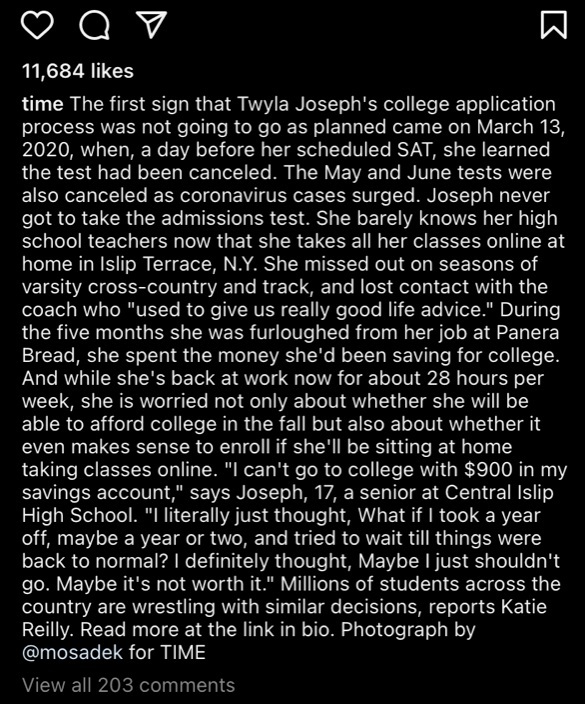 2021-04-02
2021-04-02The Lost Year: How the Pandemic Changed a Generation of Students
Time magazine explores the effects COVID-19 has had on students, especially those who spent their last year in High School dealing with quarantine and virtual learning. -
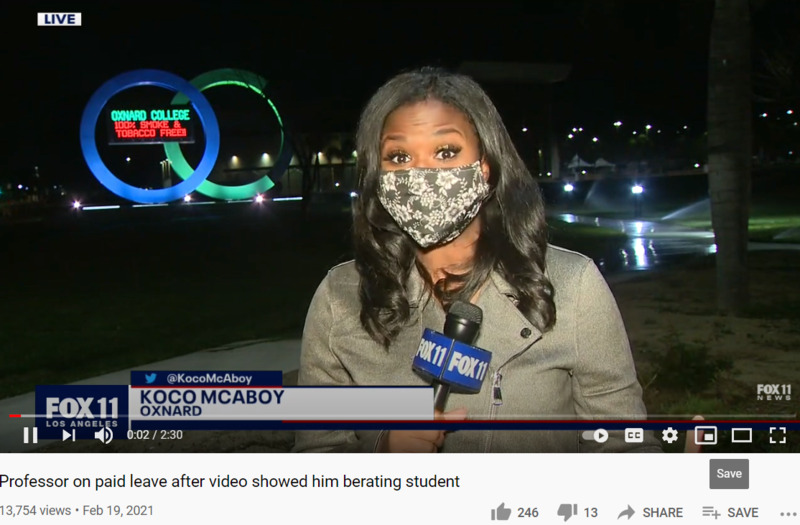 2021-02-19
2021-02-19Professor Abusive Toward HoH Student in Online Class
A professor is being placed on paid administrative leave after a viral video showed the instructor berating a student in front of the Zoom class. -
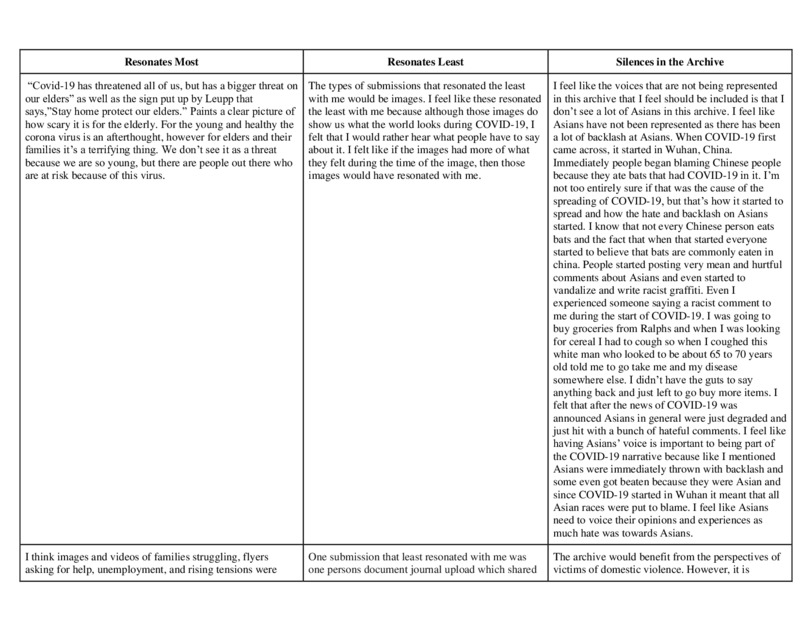 2020-06-01
2020-06-01High School Students Reflect on JOTPY Archive
In May 2020, my high school students reflected on the JOTPY archive, noting the submissions that most resonated with them and the least. Some also addressed what they saw as silences in the archive. I put their responses in a document for myself to help guide me as I helped build the JOTPY teaching site. However, a year after beginning to work on the project, I find their responses very insightful, particularly their recognition that the racial prejudice facing the Black and AAPI communities needs to be better highlighted. -
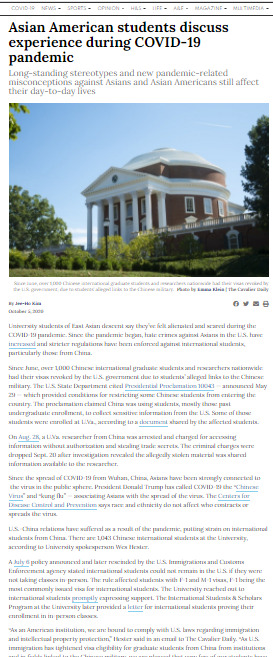 2020-10-05
2020-10-05Asian American students discuss experience during COVID-19 pandemic
Long-standing stereotypes and new pandemic-related misconceptions against Asians and Asian Americans still affect their day-to-day lives. University students of East Asian descent say they’ve felt alienated and scared during the COVID-19 pandemic. Since the pandemic began, hate crimes against Asians in the U.S. have increased and stricter regulations have been enforced against international students, particularly those from China. Since the spread of COVID-19 from Wuhan, China, Asians have been strongly connected to the virus in the public sphere. President Donald Trump has called COVID-19 the “Chinese Virus” and “kung flu” — associating Asians with the spread of the virus. -
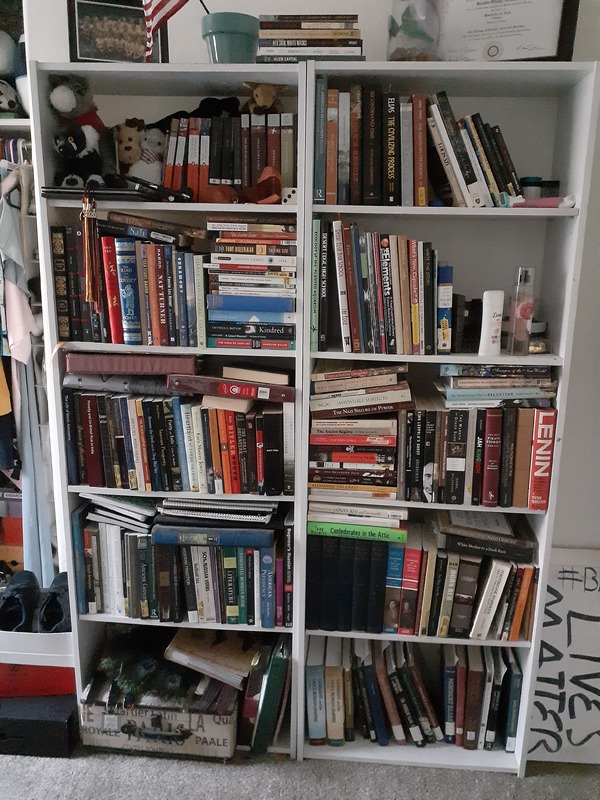 2021-03-10
2021-03-10A Lot More Time at Home
An interesting consequence from being locked inside day in and day out for almost a year. My collection of books has grown considerably, to the point of needing yet another bookshelf. -
2021-02-18
My Keys to a Year in Isolation
Starting on March 9, one university email followed another; the rapidly spreading pandemic meant that campus residents like me had to immediately find new housing. Unhappy and depressed with my dorm, I was actually glad at this chance to move. As soon as March 11th, I was already searching for a new place to live. Though I was relieved, I basically had to abandon my end-of-term schoolwork to secure an apartment. This came with consequences and I ended up taking three incomplete grades. I signed a lease on March 21, 2020. A year later, COVID-19 continued to spread and I recently renewed my lease. From top, these are my mailbox, unit, and building keys to my ~220 sq. ft. Chicago studio. -
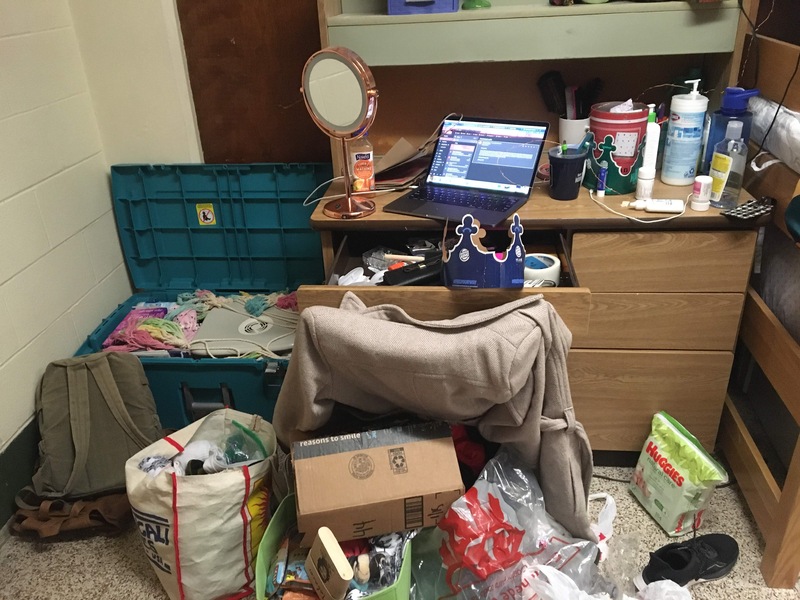 2020-03-12
2020-03-12Such is life in Covid Time
On February 21st, 2021, one of my professors—while on an exceedingly off-topic tangent during a lecture about Medival Spain—flippantly remarked that in the age that we currently live in, there is now such a thing as “BCT” (“Before Covid Time”) and “CT” (“Covid Time”). According to him, we are currently living in both the year 2021 AD (or CE) and the year 1 CT. Our life as we know it, in the eyes of my professor and Julius Ceaser, is measured and marked by the birth of Jesus Christ and the contagious disease known as Covid-19. And just as it was for the birth of Jesus Christ, it exceedingly easy to pinpoint the exact moment when such a shift in time, from BCT to CT (at least in the United States), had occurred. It was the second week of March. Or, to be more exact, the 12th of March, the day when everything changed for a college student such as myself. On March 8th, 2020 (both AD and BCT), I had awoken as an average American college student in my dorm room. I had just gotten back from a spring break study abroad trip to the country of Cuba, and I was excited for classes to start back up the following day (and continue for the rest of the semester). Nothing was out of the ordinary. Life was continuing as we knew it. Covid-19 was an intangible construct at that point in time, some unseen nightmare way off in the distance that could not reach us. Nothing we needed to worry about, especially as young college students. There were hardly any reported cases yet if any in the United States. Everyone used to say, “oh, that Covid thing? Yeah, it’s just in China. Or Spain. Or Italy,” and then they would go about their day, not giving it any more thought. It was hardly even anything newsworthy. When I was in Cuba that first week of March, the only news we ever received (when we got signal or wifi, which was not often) was about the election, nothing Covid related. People even made jokes about it. That was just how life was in BCT, even a week before everything changed. Hell, even a few days before. On Monday that week, everything was normal, college life as I knew it continued—I saw my friends, got my meals in the ever so crowded dining hall, and went to classes with the max capacity of students. On Wednesday, the college Instagram meme page had posted a Covid update for the first time—there was a confirmed case not too far from campus—yet things continued as usual. However, on Friday, March 12th, 2020, almost a week after I had been partying it up in a packed club in Cuba with absolutely no awareness of the elusive plague that thrived halfway across the world, the shoe suddenly, and finally, dropped. I had shown up to my “Basics of Math” class to find that there were only five people (other than me) in attendance, and not even six hours later, we were given three hours to pack up and leave campus (pictured, me in the midst of packing up). I did not know it then, but we would not be allowed back on campus for another five months, almost 160 days in total. It is no exaggeration when I say that from that moment on, I felt as if I were a Depression Era family, evicted from their home, with all their belonging out on their lawn, with no knowledge of where to go from there. Even though I had my childhood home to go to, I felt, for lack of a better term, “out on my butt.” It was as if I was displaced, uprooted, cut adrift, and lost. I had not even unpacked any of my belongings when I arrived back home. I lived out of my haphazardly packed—and it was haphazard; I had packed up my dorm room in a sweat-inducing and crazed rush—suitcase until it was time once more to pack up and go back to college five months later. And my physical being was not the only thing that felt disoriented. Just as I imagine it was with most other college students during this time, the 2020 spring semester was one of my worst academically performing semesters to date. Although now, almost a full year later (entirely in Covid time), I am most adept at zoom life and the socially-distanced way classes are held, at the time, absolutely not. With every single one of my classes now on Zoom or some virtual variant, it became most difficult for me to adjust to the new way of things. Not even the professors knew what they were doing. Everyone was struggling. And it certainly did not help that my house had now taken on the most distracting nature ever to date. My sister, my mother, and my father were quarantined with me at home. That particular combination of people and location was about as conducive for my studies as it would be if I were studying amid an active circus. Not even when I was in class could I be completely unbothered. With no desk in my room, which I shared with my sister at the time, I was forced to partake in class and do my assignments while sitting next to my mother taking business calls, my sister playing on her Nintendo switch or watching a tv show, and my dad listening in on his own classes or playing the drums. It was a breeding ground for distraction. I would go as far as to say that I was lucky I even got the grades I ended up with that semester. It truly was an abysmal time. Although I certainly do not have to tell anyone that. Life as a college student during CT had proved most difficult. And it still has not entirely let up. Although for the 2020 to 2021 academic year we have thankfully been allowed back on campus, student life has not yet reverted to how it once was (for better or worse). Classes now have a capacity limit (with socially distanced desks, six feet apart), the dining hall tables now only sit two, we have to make reservations for every meal (to limit how many people there are at a certain time), you are not able to frequent any dorms other than your own, masks must be worn at all times, some classes are held over zoom, or even outside, off-campus travel is prohibited, and there are only specific entrances and exits you can use for every college building. College life—a time which was always regarded as the free-est time of one’s whole life—is now the most massively regulated. And all I can say to that is, “c’est la vie.” Such is life in “Covid time.” -
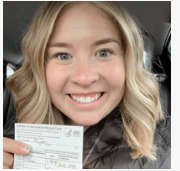 2021-02-05
2021-02-05Keena Covid Vaccine Booster
I got my vaccine booster on Friday, February 5th, at 4 pm. I was very excited to return to the local hospital for this vaccine appointment. On February 1st, tier 2 had opened, and vaccines were now being offered to anyone over 65. The hospital had really stepped up their game and was administering about 20 vaccines every 4 minutes (I asked), and they were so efficient! I got my second dose and then sat waiting in the lobby for 15 minutes. While I was waiting, there was a woman behind me (older than 65) who had just gotten her first dose. She was scheduling her appointment for her booster and struck up a conversation. She told me that she was so sad that so many people were dying, and she was excited to get the vaccine. She also mentioned that since her husband had died and she was no longer able to drive, she took a cab for the 45-minute drive to the hospital. She didn't care what the cost was - she wanted the vaccine. It was really quite sweet. After my shot at, 4 pm my husband and I went to our friend's home for our usual Friday night take out dinner. Around 10 pm, while we were still at our friend's home my ankles, knees, and hips began to get unusually sore. We left shortly after, and I was uncomfortable the entire car ride home. When we finally got home, I went straight to bed. At 6 am, I woke up with a splitting headache, body aches, and chills. I got myself out of bed to go to the bathroom (about 3 steps away) and immediately felt nauseous. I returned to bed, woke up my husband, and asked for water, Tylenol, and a heating pad. After taking Tylenol, I fell asleep for about 1 1/2 hours. Again, I woke up with a splitting headache and body aches but couldn't take any more pain relievers. I just laid in bed trying to get some rest and ordered Chick Fil A breakfast; I'm not sure why but that's what I was craving. I got out of bed to eat breakfast and promptly returned to bed. I took more Tylenol at 10 am and fell asleep for another hour and a half. When I woke up shortly before noon, I took a bath to calm down my body aches. My wrists and my shoulders/armpits hurt the worst. I stayed in the bath for about 30 minutes, which is a lot for me because I honestly cannot remember the last time I took a bath - I think they're gross. After that, I moved out to the couch, took more Tylenol, and watched a movie. When the movie ended, I went back to bed. I slept from about 3 pm to 5 pm. When I woke up, I took more Tylenol, moved to the couch, and watched another movie while my husband made dinner. I had some dinner and stayed on the couch until 10 pm. While the Tylenol helped with the body aches for about an hour, nothing seemed to touch my headache. I was using a heating pad on my neck and doing some yoga to try and stretch it. I went to bed with my usual nighttime routine and fell asleep around 10:30 pm. I didn't wake up at all overnight. I woke up on Sunday at 8 AM feeling AMAZING. It was like I had never reacted at all. My arm is not sore; I have no body aches and no headache. My husband is a third-year med student and spent most of Saturday looking at me like a science experiment because my body was reacting to the vaccine exactly like it was supposed to. Through all of the pain on Saturday, I was silently cheering on my body for doing its job because I knew that meant it was working. Through the entire pandemic, I was able to remain Covid free (as far as I know), and I would certainly take 1 day of vaccine induced pain over 7 days of Covid. -
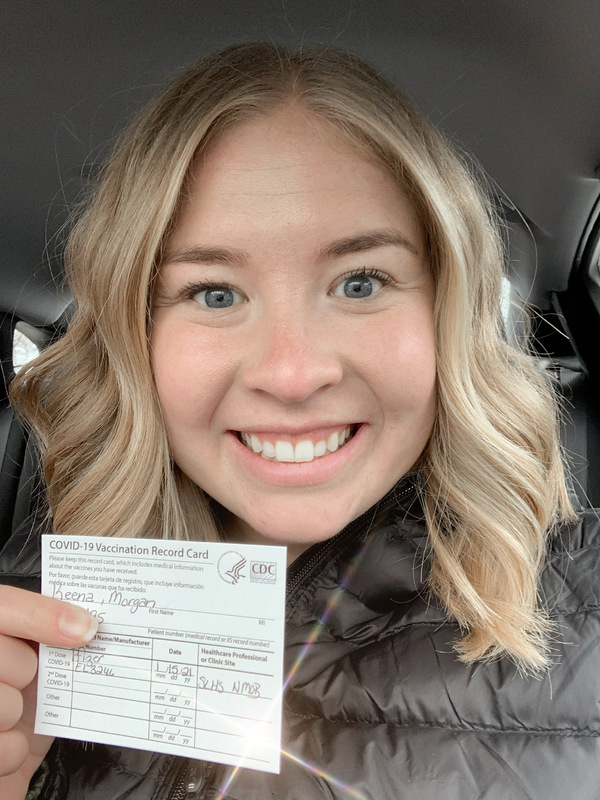 2021-01-15
2021-01-15Keena Covid Vaccine
My name is Morgan Keena, I live in Nampa, Idaho, I am a 7th-grade social studies teacher, and I got my first dose of the Covid-19 vaccine today! Teachers weren't scheduled to start receiving the vaccine in Idaho until late February or early March. However, on January 11, 2021, our state superintendent of education delivered a speech to the Idaho legislature urging them to pass a law that would require all school districts to stay open unless mandated by the governor. Additionally, she urged that all students return to in-person learning full time as quickly as possible. On Tuesday, January 12, 2021, the governor of Idaho, Brad Little, announced via a press conference that K-12 teachers and staff were moved to the top tier and could start receiving the vaccine on January 13, 2021. This came as a huge shock to educators everywhere, but we know it is tied to the demand to have schools 100% in person. My school district, Nampa School District, then took on the momentous task of figuring out how to obtain vaccines for their nearly 1,000 staff members. Less than 36 hours later, they had secured vaccines for us at three major health systems and two smaller urgent care locations. The district also had one health system offering the vaccine on Saturdays and Sundays to better work with the teacher schedules. We managed to crash the portals of two health systems by overwhelming them with many vaccine sign-ups. I (by a miracle) was able to secure an appointment for January 15, 2021. Let me tell you; I have never been so excited to get a shot in my life. I received my vaccine from St. Luke's Health System in Nampa, Idaho. The check-in process was a breeze and done entirely on my own. I was very relaxed while waiting for my appointment but also exceptionally eager to get back to my room and get this first dose done. Once my name was called, I met with the pharmacist who would be administering my vaccine. She was a lovely woman, and I consider myself fortunate to have met her. She was such a calming presence as she explained the emergency use authorization for the vaccine, potential side effects, and what I could expect in the days after receiving this dose. She continued to use the line, "when I got my first dose...." which made me feel at ease. We talked about my job, her children, and how this school year has been wild. Suddenly, it was over! I had my vaccine and was ready to take on the world! Almost. After a couple of cases of allergic reactions to the vaccine around the country, they now require you to wait in the waiting room for 15 minutes after receiving each dose. I received the Pfizer vaccine and have scheduled my second dose for three weeks from today. As I was doing my time in the waiting room after my injection, I signed up for a program called V-Safe. V-Safe is run by the CDC and is used to track vaccines' side effects. Since this vaccine has emergency authorization, they are still collecting side effect data. since I signed up, they will message me once a day for the next week to do a quick wellness check. After the initial week, they will message me once per week to continue keeping up with any side effects I may encounter. I figure it's the least I can do to help science. I am super excited about receiving the first dose of this vaccine. My husband also received it today, and we are overjoyed by that. He is a third-year medical student rotating through various hospitals, so getting him a vaccine was a priority of ours, but it proved to be more difficult to obtain than we had thought. He received the Moderna vaccine, so we get to see how both vaccines work. I received the vaccine because I expect our school board to bring back middle school students 100% in-person and full time soon. Social distancing will not exist in the classroom, and I will be exposed to 150 students in my classroom and the other 150 students in my wing of the school. This is a good day for science. I feel excited and hopeful. I feel like I have hit the 'covid wall' lately, and I am just ready to be done with this. -
 2020-01-11
2020-01-11Silent Bells & Quiet Halls: An Auditory Experience of the COVID-19 Pandemic
In almost every aspect of life, COVID-19 has put the world on mute. From canceled weddings and downsized gatherings to remote workspaces and quiet homes left behind by those we have lost, the overwhelming soundtrack of the pandemic is silence. When K-12 students in the United States transitioned to distance learning nearly 10 months ago, elementary, middle, and high school campuses were abandoned, leaving bells silenced and hallways quiet. From March to November, this silence came to define my work at Princeton Joint Unified School District in the rural town of Princeton, California. No longer did bells ring to mark the end of one period and the beginning of another, lockers no longer slammed shut as students rushed to gather their belongings, and students could no longer be heard gossiping, laughing, and playing during morning break. While this silence initially felt like summer vacation had merely arrived a few months early, the lack of auditory stimulation began to diminish morale and decrease productivity as work felt further removed from the students themselves, transforming human beings into pieces of data and names on a paper. I could often go an entire eight-hour shift without speaking to another person, frequently finding my voice raspy when I would pick up the phone for the first time in hours. Even among coworkers, passing conversations vanished and became simple one-line emails dealing only with the business at hand. As Zoom calls replaced in-person staff meetings and participants remained on mute, the noisy world in which I once worked fell even further away. When in-person learning became optional in November, the sound slowly began to return, but it had changed from what it once was. Growing accustomed to the silence over the long summer, I often found myself jolted in surprise at each unexpected bell or sound of students on the playground. The number of students has drastically lowered since we first closed in March, as many opt to remain home to avoid possible exposure, while lunchtimes are now staggered, and breaks are shortened to prevent spread, creating ominously quiet and often uncomfortable atmospheres. The unease and discomfort heard in students' softened voices displays that widespread uncertainty that has permeated every corner of society. It is my greatest hope that schools will return to "normal" for the 2021-2022 school year and that the sounds of carefree students once more fill the hallways and classrooms of Princeton Joint Unified School District. Silence has become an all-too-painful reality of the COVID-19 pandemic, and I look forward to the day that bells ring on their regular schedule, coworkers are free to converse with one another, and every student returns to campus. In images and articles documenting the pandemic, the overwhelming auditory silence that many of us are experiencing is often lost and forgotten. -
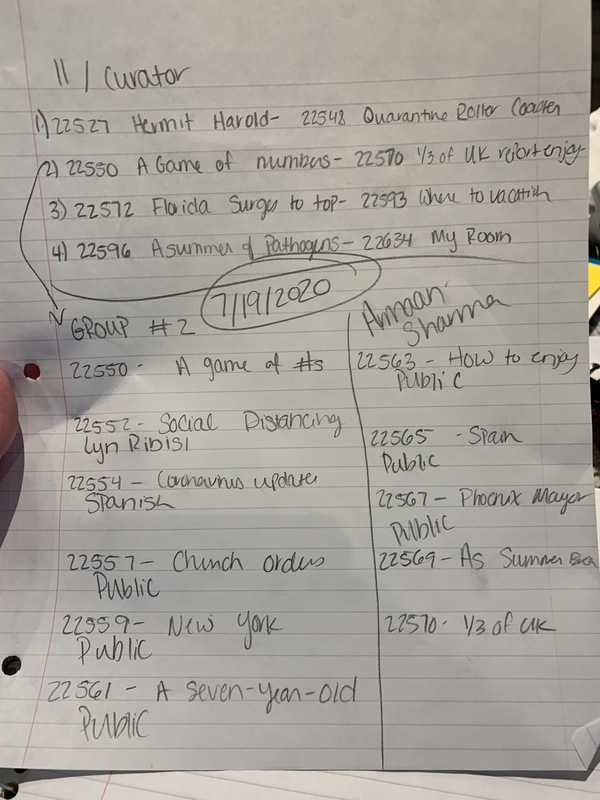 2021-01-01
2021-01-01Summer Reflection
In March of 2020 the state of Idaho enacted a stay at home order. As a teacher I began teaching from home and my husband (a second year medical student) began attending all of his lectures from his office. In my mind I thought, "wow, we're going to get to slow down for a moment." I was so wrong. As a teacher I felt well prepared to move my students online. We already had the tools and platforms in place to make the transition go well. However, I wasn't ready for the overwhelming anxiety that came with the idea of walking away from my computer at the end of the day. Needless to say we continued on with our busy life from the confines of our 3rd story apartment. I continued my grad school class and teaching online while my husband continued studying and preparing for his first board exam. Over the summer I interned with JOTPY. The 12 hour / week commitment to the internship seemed doable and I was ready to be working on something. I'm not entirely sure what happened over the summer but I seem to have been so busy that it quickly turned into a whirlwind. The pandemic was supposed to have this major impact on what I was doing but I found ways to stay exceptionally busy. All of this to say I didn't have time to really reflect on my summer and internship experience. Looking back all I can say is wow. I was cleaning out my desk area last week in preparation for the return to work and grad school and as I was flipping through my notebook I found this page. This page represents a night from this summer that is hard to forget. I was busy working through my curation assignments in preparation to take the weekend off. However, about halfway through my assignment my curation group (shoutout to group 4!) starting chatting via Slack. We we just 4 students who were assigned to a group and we hadn't really chatted before. Suddenly we were talking about everything under the sun while all working through our curation assignments. I don't know that I have more to say on it except that it was fun and joyful. As 2020 turned to 2021 I started to reflect on the year that turned life upside down and I realized that it brought so much joy. While my husband and I have been blessed with our continued health throughout the year we acknowledge those who have not. -
2020-12-17
How COVID-19 Affected My Daily High School Life
This is a journal entry I created when school started online learning. At the time, I was frustrated and upset at the online learning, but now I have been able to adapt and overcome the adversity our society faces. Covid-19 has greatly impacted my family. I have been continuously doing online school at California high school and at DVC. I personally strongly dislike it. We are staring at a computer all day for classes and to do homework. The online classes make me tired and lazy. With sports pretty much stopped, it is hard to go outside and practice all by yourself. For my dad, his work has been greatly affected. His workload has dropped and he has constant precautions for his employees. He almost even had to shut down. For my sister, she was finally able to college three months late. They might also cancel her soccer season at UCSB. For my mom, she is very cautious about being around other people because of her parents and their health. This pandemic has influenced the world away from socializing. I can rarely hang out with people and being on zoom is annoying. We are doing the same thing over and over again when it seems like there is no purpose. Our entire world as we know it flipped over and is completely different now. I need school to go to hybrid and sports to start back up soon. -
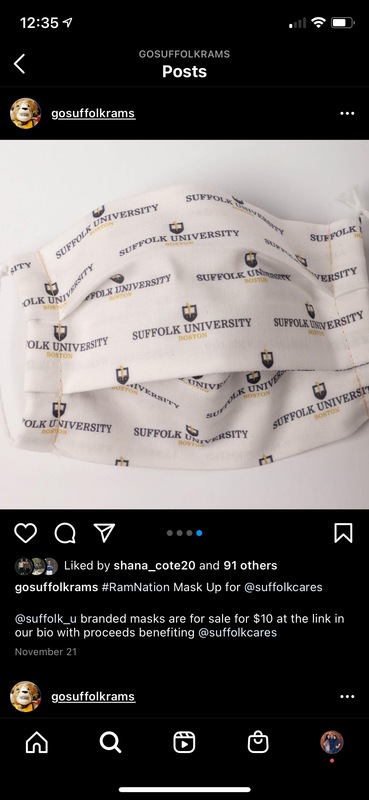 2020-12-16
2020-12-16Suffolk Masks
Everyone has a mask these days and they are all so unique or plain. Suffolk created their own mask along with a few other styles that students could buy. It is easier to recognize suffolk students when wearing these masks. It is cool to see Suffolk step up and be a part of the pandemic and create new things for their students. Us athletes got a separate mask, seen in the second photo, it is called a gaitor. A lot of the athletes would wear them walking or at practice/in the gym. It separates the athletes from the regular students. Suffolk wanted to be a part of this history so they created these masks. These objects are important to Suffolk’s history through the pandemic and how they chose to help their students out. This is also significant in the year 2020 because everyone was designing their own masks and it was cool to see how all of the colleges and universities came together to create their own masks and contribute to today’s history. -
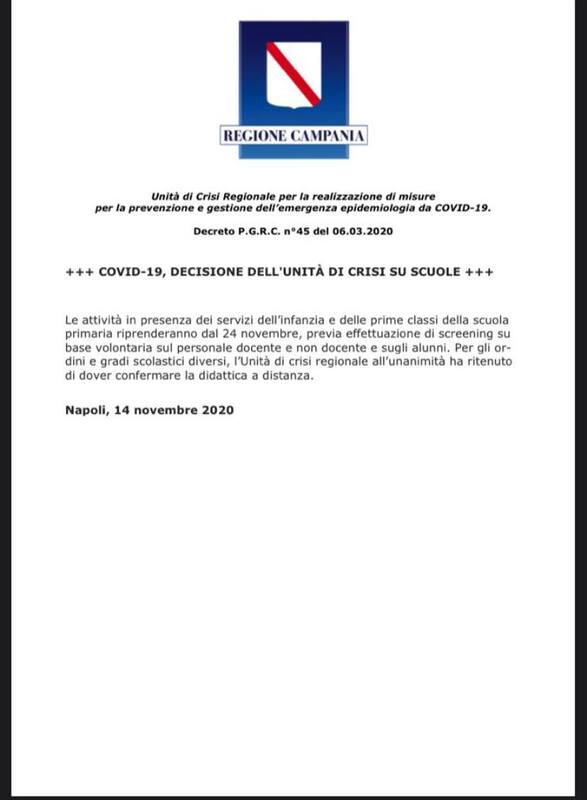 2020-11-14
2020-11-14Online Learning Notice in Alife, Italy
Translation to the above newsletter - Activities in the presence of the childcare services and the first grades of primary school will resume from 24 November, after screening on a voluntary basis on teaching and non-teaching staff and on pupils. For different school levels and orders, the Regional Crisis Unit unanimously felt it was necessary to confirm distance learning. This newsletter explains the precautions that a small town in Italy is taking in order to prevent the spread of COVID-19. I think it is important to learn about what other countries are doing in order to keep the community safe. This is important to me because my family is from a small town in Italy called Alife. My family in Alife has younger children that have been directly affected by this new decision to move the school from in-person to online learning. This object demonstrates something significant about my generation under COVID because many children are being taught online rather than in person in order to mitigate the spread of COVID-19. As the article entitled “What do archivists keep or not” describes “documents of all types help us to remember, to share, to compare, to analyse and to synthesize information” *Thompson, 3). Documents are pivotal because they can create a snapshot of what life was like during a monumental event in history. Many of these children have never experienced online learning and therefore, it can be challenging for children to remain engaged and motivated to learn. -
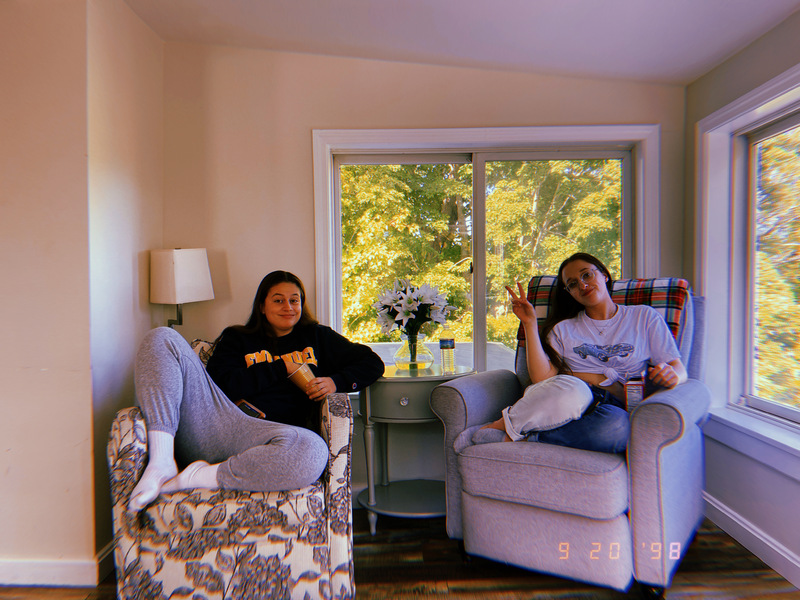 2020-09-20
2020-09-20Coronacation
In September 2020, myself and three friends took a mini-vacation to Derry, New Hampshire in order to get out of our small town of Middleboro, MA. We rented this house and mainly did our homework and hung around playing games. From this trip, it was interesting to see the difference between Massachuttes and New Hampshire as we saw people leaving restaurants without masks and it felt more “laissez-faire” in a way. This picture connects to “the needs and considerations of an ethical archival collection”. This is because I wanted to show that I, like most people, was not a saint during quarantine and broke the rules at some points. We made sure the house was safe by disinfecting when we got there and other safety measures in order to not get sick. By acknowledging this moment, I wanted to show what I was really like during this time period, not an idealized version of myself that could do no wrong. I know that I haven’t always been the safest and it will help with my credibility. -
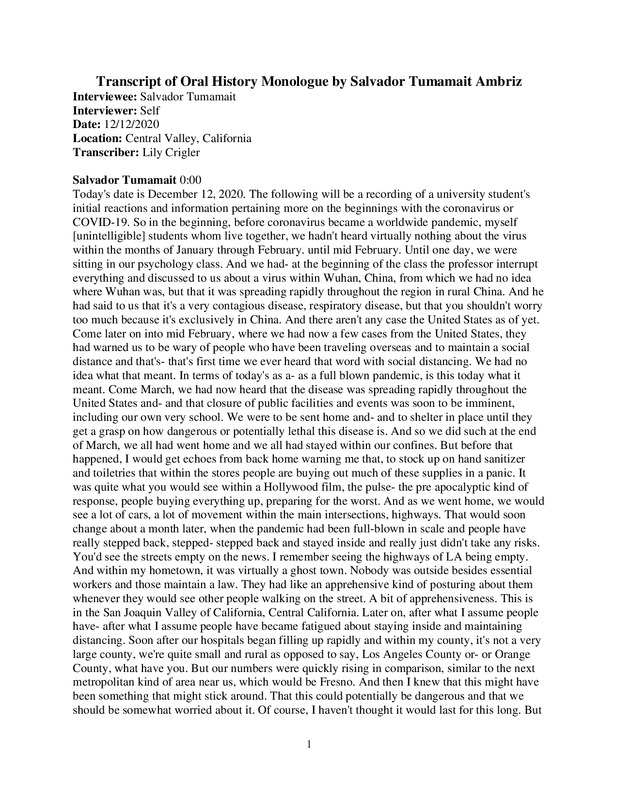 12/09/2020
12/09/2020Salvador Tumamait Ambriz Oral History, 2020/12/09
The following submission is a brief statement on the experiences of myself and the thoughts I had until the end of the year. It will show the progression within one area devastated by the virus. -
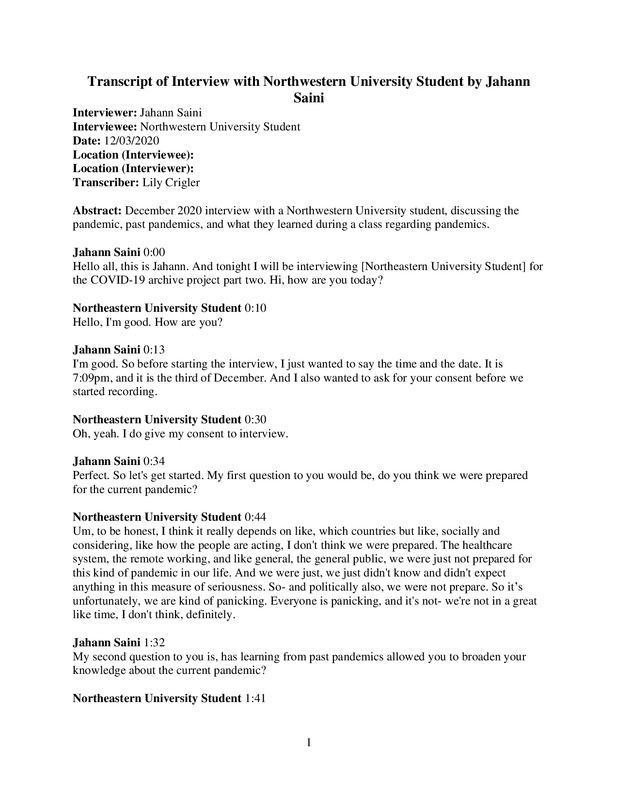 12/03/2020
12/03/2020Anonymous Northeastern University Student Oral History, 2020/12/03
This is an interview with a classmate. In the interview we discuss the handling of the pandemic and we also discuss previous pandemics as well as what we can learn from them going forward. -
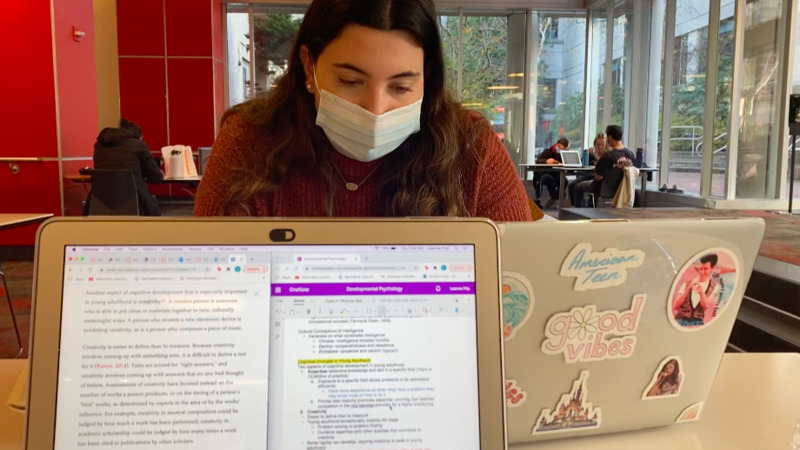 2020-11-19
2020-11-19Student Life During a Global Pandemic in Boston
I was supposed to spend my first semester of college abroad in Rome, Italy as part of my acceptance into Northeastern's NUin program. Due to the pandemic, I had to switch my location to London, England and then ended up having to switch to Boston, Massachusetts. But despite the unexpected change in location and covid-19 guidelines, I ended up having an amazing first semester here in Boston. Life on the Northeastern campus was definitely not what I was expecting for my first year of college, but my peers and I were able to quickly adapt to the safety guidelines and online classes. My entire education relied on one thing this year... the strength of my WiFi connection. As you can see in the photo, all of my classwork, textbooks, assignments, and professors were primarily accessible from my laptop. Instead of being taught in-person with a live professor, all I had to do to get to my class was open my computer and click a link to a Zoom meeting. This made it easy to attend class, but it also made it very difficult to focus during class because I was able to mute myself if I didn't feel like paying attention. If I learned anything from going to school during the covid-19 pandemic, it was self discipline. This is because I had to make sure that I stayed focused on my classes when I could have easily not been paying attention. -
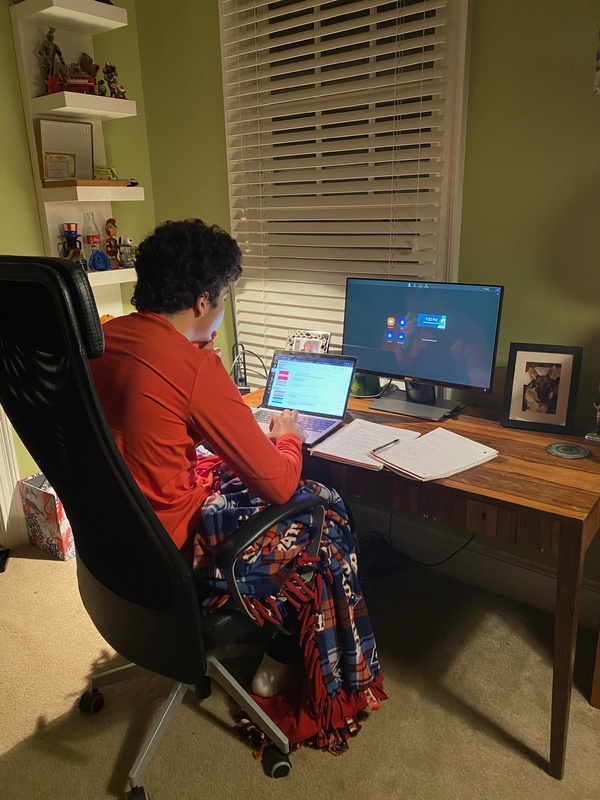 2020-12-02
2020-12-02Studying From Home During a Pandemic
This is a picture of me, Dylan Sacks. I am currently a freshman at Northeastern University in Boston Massachusetts. Although I was on campus for the majority of the semester this year, I am home for about 10 weeks in total, because of the pandemic. Although Northeastern is unique compared to other schools because the majority of other schools around the country did not allow students to come back to campus after thanksgiving because of the pandemic, I made the personal choice to stay home until second semester begins (mid-january) for my own safety. This is where I spend most of my time, studying and working hard. On the computer monitor the application "Zoom" is pulled up. This is what all of my classes use so the students can feel as if we still have class. The difficulty is trying to feel as though these are normal times, and Northeastern and their amazing staff are doing everything they can to give us the closest they can to a traditional college experience.
